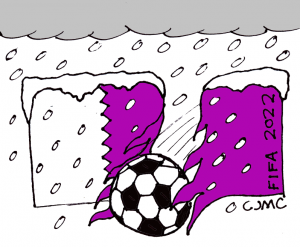Worrying about things seven years in advance might seem like overkill to some people, but the degree to which the 2022 World Cup has already been mucked up might just convince them.
The World Cup is set to be played in winter 2022 in Qatar and, somehow, the results are already disastrous.
For starters, there’s a mounting pile of evidence that’s been building for a few years now that shows pretty clearly that Qatar engaged in heavy bribery of FIFA officials who had a hand in awarding them the tournament. FIFA’s own internal reports prior to voting identified Qatar as one of the worst possible hosts among all countries being voted on. Regardless, numerous FIFA officials have now either resigned or been banned for life by the organization amid allegations of bribery.
In addition, the lead investigator into the allegations resigned after FIFA refused to publicly announce his damning findings on Qatar’s behavior.
Now, you may be asking, why’s this such a big deal? In the end, the World Cup needs to be played, and now it has a host, yes? Well, there are a few major problems. Chief among them is that, in the entirety of Qatar, there is not a single regulation-size soccer stadium. Consequently, the government is using what amounts to slave labor to build stadiums, infrastructure and entire cities before the tournament.
An ESPN report found workers living in horrible conditions for meager pay, and many of the immigrants in the workforce have been threatened with confiscation of their passports if they try to leave. In the meantime, over 1,200 workers have already died in construction—the Guardian reported that one Nepalese worker died every two days in 2014.
This shouldn’t be a surprise when one considers that Qatar has consistently been ranked as one of the worst places on earth for workers.
The stadium’s problem should sound familiar. Remember Sochi? Russia spent $50 billion building stadiums and relevant infrastructure for last year’s Winter Olympics, a record-breaking number, and that doesn’t even come close to the number at which Qatar is staring.
Early estimates predict that Qatar will spend $200 billion purely on venues and infrastructures in the next seven years, with much of the cost coming from Qatar’s need to build entire cities in anticipation for the visiting fans, teams and workers.
That’s right—entire cities are going to be built just to meet the most basic requirements for hosting a World Cup. By the way, most of these buildings are going to be used for the World Cup and then abandoned.
The scheduling is a nightmare as well. The World Cup is traditionally played in the summer in order to work around professional soccer leagues all over the world, but as FIFA’s internal reports put it, holding the cup in Qatar would be a “health risk” to everyone involved. Summer temperatures in the Middle Eastern country usually hover around 105 degrees Fahrenheit, and while Qatar originally said they would invest in a highly complex air conditioning system for the stadiums, the technology still doesn’t actually exist—so that’s a no go.
Instead, most major leagues in the world will have to suspend play for months right in the middle of their seasons, which FIFA has refused to compensate them for.
If that all sounds bad, brace yourself—it gets worse. Qatar has more liberal policies than most Middle Eastern countries, but they still have draconian anti-homosexuality laws. Luckily, FIFA president Sepp Blatter had a brilliant solution, recommending that gay fans should “refrain from any sexual activities” while in the country.
After that, other problems that would normally be a big deal seem pale in comparison. For example, no alcohol is allowed to be sold in stadiums, so any fan looking to escape the heat (by the way, it’s still usually above 80 on a normal November/December day in Qatar) will have to look for other options. In addition to that loss of revenue, the scheduling will conflict with NFL games, which, unless American attitudes about soccer are drastically different in 2022, will represent a major loss of television viewership for the tournament.
The list goes on and on. FIFA has a history of this sort of mismanagement, but this is an all-time low for the organization. Hopefully, the situation will improve over the next few years. Until then, just try and look forward to the 2018 World Cup. Luckily, the tournament is being hosted in an international bastion of democracy and freedom—Russia.
Bernstein is a member of the class of 2018.





